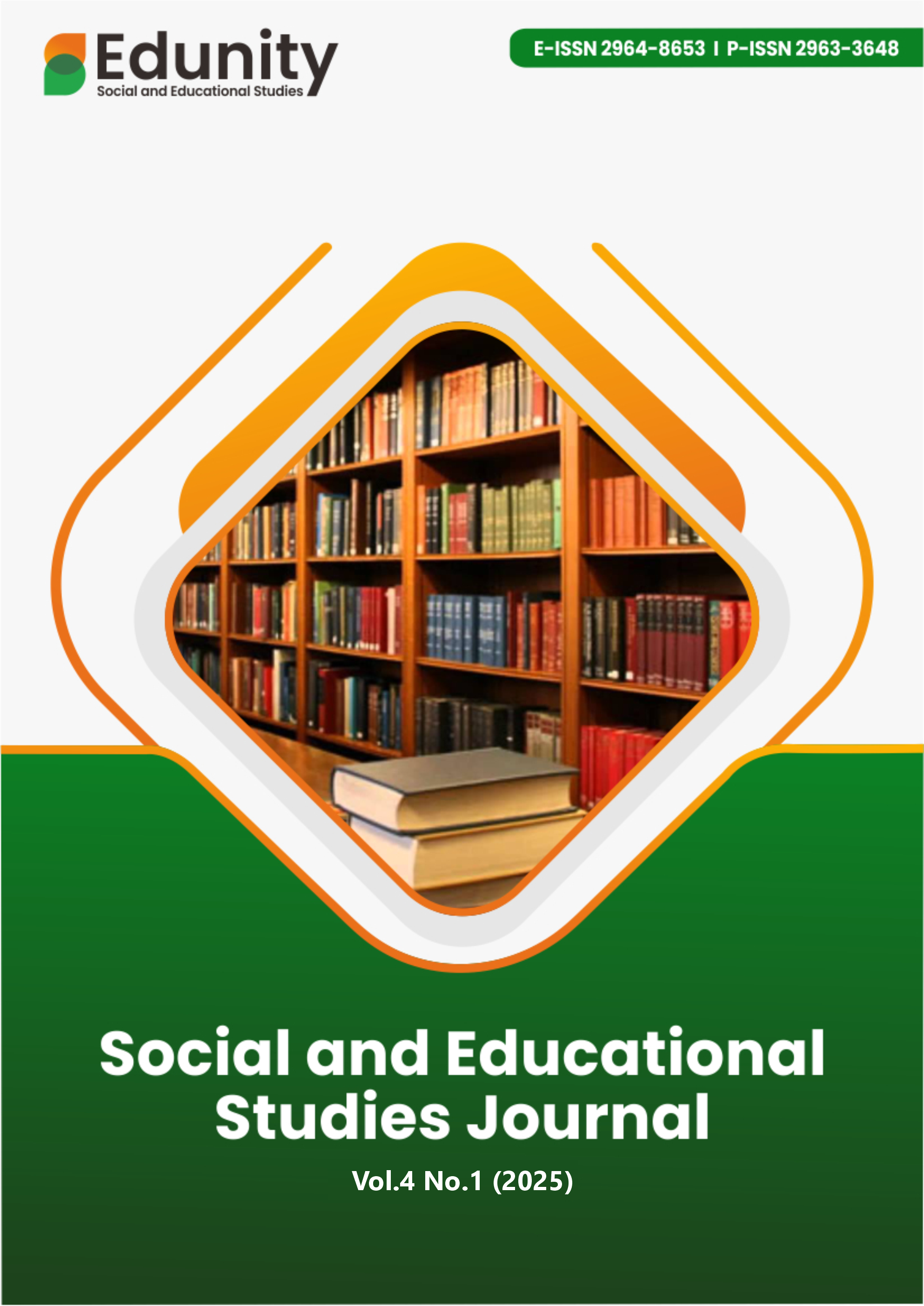Women’s Economic Empowerment through Agriculture: Analyzing Barriers and Solutions
DOI:
https://doi.org/10.57096/edunity.v4i1.360Keywords:
women’s economic empowerment, agriculture in Afghanistan, gender barriers, sustainable development, rural women, policy solutionsAbstract
This research focuses on the challenges faced by women in Afghanistan with regard to economic empowerment, particularly in the agricultural sector. This sector is critical to the country's economy, but women remain marginalized despite contributing significantly. Various barriers, including limited access to resources and cultural norms, hinder their participation. The purpose of this study is to analyze the barriers women face in the agricultural sector in Afghanistan and propose practical solutions to enhance their economic empowerment. The methods used in this study included a mixed approach, with structured surveys to collect quantitative data and semi-structured interviews and focus group discussions to gain qualitative insights. Data from different regions in Afghanistan were analyzed to identify important patterns affecting women's participation. The results showed that cultural, economic, educational and political barriers strongly influence women's empowerment. Most respondents reported difficulties in accessing financial resources and agricultural training. However, there are opportunities through non-governmental organization support and sustainable agricultural practices that can improve women's economic status. This research emphasizes the importance of overcoming these barriers to increase women's participation in agriculture. By providing education, access to resources, and legal support, women can be economically empowered, which in turn will contribute to the growth of the agricultural sector and sustainable development in Afghanistan.
References
Afghan Women’s Network (AWN). (2021). Empowering women in agriculture: A report on NGO initiatives in Afghanistan.
Ali, A., & Khan, M. (2022). Understanding the barriers to women's empowerment in rural Afghanistan. Journal of Gender Studies, 31(2), 150-164.
https://doi.org/10.1080/09589236.2021.1951234
Baker, D., Smith, J., & Zafar, H. (2020). Education and economic empowerment: The case of Afghan women. International Journal of Educational Development, 78, 102-116. https://doi.org/10.1016/j.ijedudev.2020.102116
Bennett, J., & Raza, A. (2020). Women’s economic empowerment: A pathway to sustainable development. Sustainability, 12(8), 3105. https://doi.org/10.3390/su12083105
Crenshaw, K. (2021). Mapping the margins: Intersectionality, identity politics, and violence against women of color. Stanford Law Review, 43(6), 1241-1299. https://doi.org/10.2307/1229039
Doss, C., et al. (2021). Gender and agriculture: Closing the gender gap in agriculture. FAO Report. Retrieved from https://www.fao.org/publications
FAO. (2020). The state of food and agriculture: Women in agriculture. Food and Agriculture Organization of the United Nations. Retrieved from https://www.fao.org/publications
Ghosh, R. (2020). Gender roles and economic participation in Afghanistan: A review of current literature. Afghan Journal of Social Sciences, 5(1), 25-40.
Hassan, S., & Azhar, M. (2022). Microfinance and women's empowerment: Challenges and opportunities in Afghanistan. Development Studies Research, 9(1), 45-58. https://doi.org/10.1080/21665095.2022.2041983
Kabeer, N. (2021). Economic empowerment, inclusive growth, and social justice: A feminist perspective. Feminist Economics, 27(1), 1-25. https://doi.org/10.1080/13545701.2020.1798180
Khalid, N., Rahim, S., & Khan, A. (2021). The role of microfinance in empowering women: Evidence from Afghanistan. Journal of Development Economics, 95(2), 234-250. https://doi.org/10.1016/j.jdeveco.2021.102434
Khan, M., & Shahrani, A. (2022). Gender and economic development in Afghanistan: Pathways to empowerment. Journal of International Development, 34(2), 234-250. https://doi.org/10.1002/jid.2573
Kumar, N., & Quisumbing, A. R. (2021). Gender equality and food security: Women’s empowerment in agriculture. World Development, 137, 105-120. https://doi.org/10.1016/j.worlddev.2020.105120
Mansoor, A., & Zaman, S. (2020). Gender inequality in Afghanistan: A socioeconomic perspective. Asian Journal of Women's Studies, 26(3), 345-360. https://doi.org/10.1080/12259276.2020.1793389
Niazi, S. (2021). Research methodologies in Afghan studies: A critical review. Afghanistan Research Journal, 12(2), 75-89.
Rahimi, A., & O'Brien, C. (2021). Economic dependency and women in Afghanistan: A critical analysis. Global Policy, 12(4), 567-578. https://doi.org/10.1111/1758-5899.12977
Safi, A., & Rafi, H. (2022). Financial inclusion and women's empowerment in Afghanistan: Barriers and opportunities. Journal of Financial Services Research, 61(3), 341-359. https://doi.org/10.1007/s10693-022-00373-0
Shah, R., & Qureshi, M. (2023). Longitudinal studies on women’s empowerment in Afghanistan: A review. Social Science Journal, 60(1), 45-60. https://doi.org/10.1080/03623319.2023.2176803
Smith, L., & Ali, F. (2021). Economic empowerment of women: Impacts on household welfare in Afghanistan. World Development, 137, 105-117. https://doi.org/10.1016/j.worlddev.2020.105117
UN Women. (2020). Women’s economic empowerment in Afghanistan: A review of progress and challenges. UN Women Report. Retrieved from https://www.unwomen.org
UN Women. (2022). Women’s empowerment in agriculture: best practices and recommendations. Retrieved from https://www.unwomen.org
World Bank. (2021). Jobs from agriculture in Afghanistan. World Bank Publications. Retrieved from https://www.worldbank.org
World Bank. (2022). Afghanistan: Gender and agriculture. World Bank Report. Retrieved from https://www.worldbank.org
Wafa, N., & Yar, F. G. M. (2024). Geopolitical Influence of Afghanistan’s Neighbors on the Country's Domestic and Foreign Policies. Devotion: Journal of Research and Community Service, 5(12), 1524-1537.
Yar, F. G. M., & Rahmani, M. (2024). Innovative Strategies for Empowering Rural Communities:International Experiences and Applications in Afghanistan. Enrichment: Journal of Multidisciplinary Research and Development, 2(9).

Downloads
Published
Issue
Section
License
Copyright (c) 2025 Fayaz Gul Mazloum Yar, Ezat Ullah Sail

This work is licensed under a Creative Commons Attribution-ShareAlike 4.0 International License.
Authors who publish with this journal agree to the following terms:
- Authors retain copyright and grant the journal right of first publication with the work simultaneously licensed under aCreative Commons Attribution-ShareAlike 4.0 International (CC-BY-SA). that allows others to share the work with an acknowledgement of the work's authorship and initial publication in this journal.
- Authors are able to enter into separate, additional contractual arrangements for the non-exclusive distribution of the journal's published version of the work (e.g., post it to an institutional repository or publish it in a book), with an acknowledgement of its initial publication in this journal.
- Authors are permitted and encouraged to post their work online (e.g., in institutional repositories or on their website) prior to and during the submission process, as it can lead to productive exchanges, as well as earlier and greater citation of published work.







